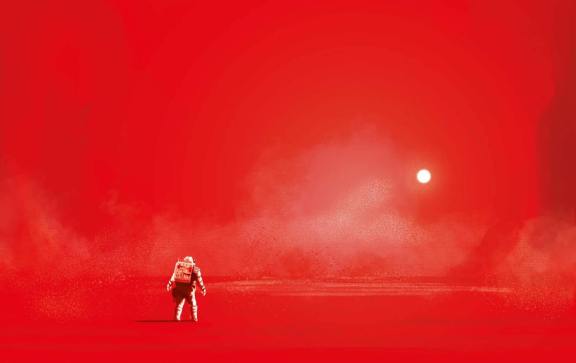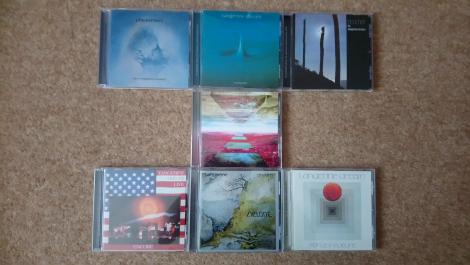
What’s to like?
Movements of a visionary band. Electronic rock pioneers Tangerine Dream finally get the box set treatment their legacy deserves, spread across eighteen discs of remastered or newly released material which offer a fascinating insight into the band’s development during their most popular period. From packaging to content to audio quality – outstanding.
The low down
All it took was one instagram photo accompanied by the briefest of texts, back in January 2018, and fans of Tangerine Dream began the longest of vigils for this box set. Steven Wilson published a photo of the multi-track master-tape for the album Phaedra, and news was out – TD’s classic 70s albums were going to receive the remastering treatment.

Since then there’s been a steady drip feed of details, including the revelation that the box set would include previously unheard material – lots of it – and claims that this set would come to be regarded as the definitive overview of the Virgin label years, TD’s most popular period. Overheated hype, or cause for mounting excitement among the fans?
The resulting box set has at its core, remasters of the albums Phaedra, Rubycon, Ricochet, Stratosfear, Encore, Cyclone and Force Majeure from the original first generation master tapes. Two of these (Phaedra and Ricochet) have been expanded with remixes by Wilson, while the other five albums are expanded with rare singles or tracks from a deleted compilation album.
Exciting enough, but then comes the really interesting stuff. Two additional discs of out-takes from the Phaedra sessions, a third disc with a previously unreleased soundtrack for a theatrical play Oedipus Tyrannus, and then a further six discs containing three complete London concerts from 1974-75.
The set is then rounded out by two blu-rays, with Wilson’s surround sound remixes in high resolution, along with footage from a 1976 German TV documentary and the BBC Old Grey Whistle Test broadcast from Coventry Cathedral. Unfortunately, multi-tracks from five of the original albums no longer exist, so only Phaedra, Ricochet and Oedipus Tyrannus get the 5.1 treatment.
But if you consider this box set overall, the volume of unexpected and unreleased material more than makes up for any shortcomings. The box set was actually delayed from an earlier release date because they kept discovering more new material!

So, the first big question. How do the remasters of the original seven albums sound? Short answer – terrific. There’s a noticeable improvement across the board, and fans who’ve been hoping for something closer to the seventies vinyl experience should be very happy with the results. The overall sound is warmer and more open, with volume levels better balanced out. Dare I say it – the results sound more analogue than digital?
I did back to back comparisons with 1995 Definitive Edition cd versions, and the improvements are subtle but very welcome. I was perfectly happy with the previous editions, but now that I’ve heard the 2019 versions I can understand why fans had been clamouring for these albums to be remastered again. Ben Wiseman has done an outstanding job on these remasters and I’ll be keeping an eye out for anything else he turns his skills to.
You can now more clearly hear individual notes within each sequencer pattern, and little background embellishments that were previously hidden. The treble is a little brighter at the top end and the bass goes noticeably deeper at the bottom end, but never sounds muddy. The overall sound is a tad quieter than the 1995 editions, but this allows for a wider dynamic range than before.
As an example, I used to struggle with the volume levels on Ricochet, which could sound quite loud at the start as drums and guitar overloaded the sound, before the synths kicked in and I found myself having to turn the volume up again. On the 2019 version the balance is much better and I didn’t have to touch the volume at all.
This re-visitation has also allowed an opportunity for glitches on the 1995 editions to be fixed. Most notably on Phaedra, where the title track now has the children’s voices restored to the fade out – on the 1995 edition it was mistakenly sequenced as the opening of the track that followed, Mysterious Semblance At The Strand Of Nightmares.
Steven Wilson’s remixes, as you’d expect, offer an interesting alternative listening experience, using the same master tracks but bringing some background elements to the foreground and vice versa. Nothing radical, and to be honest, on the stereo remixes I struggled to pick out any real discernible differences here, compared to his other work with more conventional song arrangements by the likes of King Crimson or Jethro Tull.
The 5.1 surround mixes are excellent, and wonderfully immersive. Not too loud and the music is very naturally spread across the sound-field. TD’s music is such an obvious fit for this kind of format, and it’s been worth the wait for these results. (They’ve even discretely animated the graphics around the albums covers on display on the tv screen, which adds to immersive experience.)
And so, to the new material. Even on a first listen, I was very impressed with the Oedipus Tyrannus score; it’s wonderfully evocative of Lygeti’s score on the film 2001: A Space Odyssey, and it’s especially powerful in the 5.1 surround version. If you’re a fan of the earlier TD albums Zeit and Atem, you’re really going to love this disc – the music doesn’t get much more cosmic than this.
Similarly, the out-takes from the Phaedra recording sessions are also worth the price of admission. The pieces of music on these two discs are not the usual left-overs to be given a cursory listen to and then filed away. There’s real substance to these pieces, and it’s fascinating to hear these alternative variations on the music that eventually became the Phaedra album. The equipment and sound signatures are the same, with lots of mellotron and oscillators, but with alternative patterns and melodies. (If you enjoy Rick Wright’s keyboard explorations on early Pink Floyd material, then you’ll feel equally happy with what you’re hearing here.)
The bonus tracks on the seven core albums, are probably less essential, unless you’re a completist. I found them interesting enough, but they didn’t impact on me in the same way that the box set material did, with one exception. The extended introduction to Rubycon is a worthy bonus, and offers an insight into how the album might have sounded without the time and space limitations imposed by vinyl pressing.
The three concerts included in the set, are also a rewarding listen, as much of the material was improvised on the night, and while dedicated fans might spot hints of music that would be used for later studio albums, for me it was simply a case of yet more unheard material to be enjoyed. The audio quality for these shows is very good indeed, and while there are occasional tape drop outs or equipment malfunctions on the night, it adds to the authenticity of how it really was back then.
The bonus material on the second blu-ray is worth a look but not something you’ll go back to. The German tv documentary has some interesting interview footage, and it’s nice to see Monica Froese get an opportunity to discuss her photography work for the album covers. The Coventry Cathedral concert is less interesting, with generic 70’s overlay graphics and music from the Ricochet album awkwardly imposed over the original soundtrack. However, you can enjoy that original soundtrack, or at least a portion of it, as a bonus on the Stratosfear disc.
And that just leaves the coffee-table book, with 70 pages chock full of rare photographs and memorabilia. The liner notes are informative, giving some welcome background to the band and the albums, but for some fans they may feel they’ve read it all before via fansites such as the excellent Voices In The Net.

Of course, not everyone will want to dive so deeply into this music, which is why the original seven albums have been reissued separately at a budget price. Each of these standalone CDs comes with an identical track list to its counterpart in the Hades box set, so if you’re on a tight budget, you’ll still be able to enjoy some of the bonus tracks and stereo remixes in addition to the core album tracks.

When this box set was announced, they weren’t kidding when they said it would be a definitive set covering this classic period of Tangerine Dream. There’s such a wealth of material to explore and I suspect that I won’t be the only one returning to it time and again for years to come. Long term fans should feel well rewarded for their loyalty and patience, to finally have a set like this that truly does the original albums justice and offers a unique window into the group’s wider creative process and their journey over those six years.


Pingback: A to Z links to reviews | Moments in Transition·
Pingback: Tangerine Dream – Recurring Dreams (2020) (***) | Moments in Transition·
Pingback: Tangerine Dream: Force Majeure – The Autobiography written and compiled by Edgar Froese (2019) (*****) | Moments in Transition·
Pingback: Tangerine Dream – Pilots Of The Purple Twilight (The Virgin Recordings 1980 – 1983) (*****) | Moments in Transition·
Pingback: Van Der Graaf Generator – The 2021 Reissues (****) | Moments in Transition·